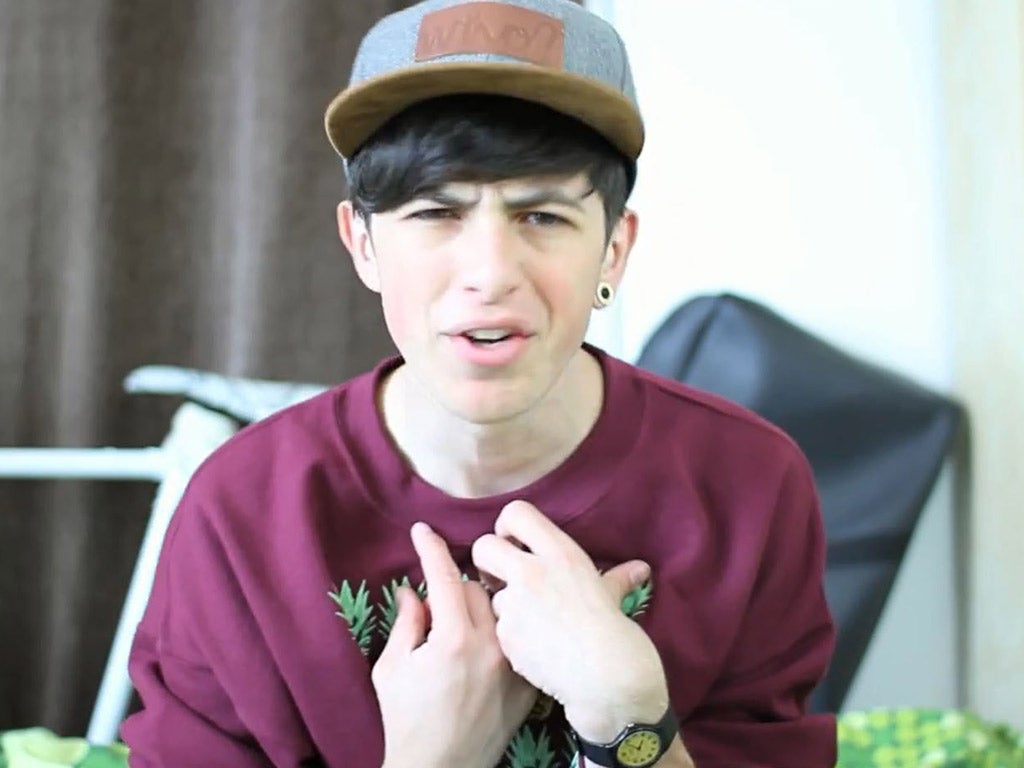The ordinary everyday superstars of YouTube
It's not all just cats on skateboards, there's some serious money being made. By Guy Adams in Anaheim

What can only be described as a "gaggle" of teenage girls spent their weekend at a convention centre in Southern California, standing patiently in a queue which stretched roughly a hundred yards and, depending on the time of day, took anywhere from two to four hours to negotiate.
At the front of the line was a 21-year-old Englishman called Charlie McDonnell, flanked by security guards. Every couple of minutes, another excited fan was beckoned forward to exchange polite conversation and perhaps acquire an item of autographed memorabilia.
Charlie, who resembles Justin Bieber's slightly geeky elder brother, inspires extraordinary devotion. His public had travelled from far and wide to attend his celebrity-meet-and-greet, and would occasionally emit a chorus of eardrum-bursting shrieks for watching TV camera crews.
"He's just a beautiful person. I don't know what else to say," explained Victoria Jefferson, 15, whose parents spent four days driving her from Tampa, Florida, to the event in Anaheim. "Am I in love with Charlie? Over the two or three years I've been a fan, it's slowly turned into something like that."
Behind her stood 17-year-old Dana Biersteker and her mother, Marca. "Charlie is cute, of course, and quirky-funny," she said. "All the girls at school are into him."
To a casual observer, McDonnell is every inch the teen idol. Yet his apparent fame, which allowed him to offload crate after crate of $10 posters and $20 T-shirts, did not come the old-fashioned way. He has never sung in a boyband, acted in a soap opera, or even, heaven forbid, set foot on a Hollywood red carpet.
Instead, Mr McDonnell, who grew up in Bath and is better known as "Real Life Charlie," is one of the biggest stars of YouTube. He earns a reputed six-figure income creating "vlogs" (video logs) about his daily existence, which are circulated to 1.5 million "subscribers" and have, at the last count, been watched almost 250 million times.
From Friday to Sunday, he was among the most popular delegates at the third annual "VidCon," a gathering of online film-makers, viral video stars, industry power-brokers, and roughly 6,000 fans.
The sold-out event bears witness to the frenzied manner in which the internet has upended traditional rules of celebrity. YouTube, which was founded seven years ago and now gets than four billion views each day, is now potentially the most powerful organisation in the history of entertainment.
It also illustrates how a medium famed for blurry footage of cats on skateboards is morphing into an outlet for professional programming. There are now more than a thousand YouTube "partners" earning in excess of $100,000 per year from the website. Their overall revenue has doubled for each of the past four years.
"It's the new rock and roll," says British entrepreneur Justin Gayner, the founder of ChannelFlip, one of the leading online TV companies, which was recently acquired by Rupert Murdoch's News Corporation. "These guys are genuine stars. We look after the fan-mail for four or five of them. They get hundreds of letters a day, containing everything from underwear to chocolate bars. This week, we had post from New Zealand, Japan, and India."
VidCon began in 2008, as an informal gathering of YouTube enthusiasts in a New York park. In 2010, it morphed into a traditional conference, attracting 1,000 delegates to an Anaheim hotel. Last year, 3,600 came. This year, that number almost doubled, drawing representatives of major Hollywood studios, TV networks, and talent agencies, who hoped to tap the zeitgeist.
"The cycle is very similar to what we saw at the start of MTV," says Fred Seibert, an influential TV and film producer who helped launch music television in the 1980s and has been investing in online video since 2005. "At first, people were asking 'why would anyone watch this?' Then they'd ask 'why isn't it making any money?' After that, they begun saying 'how can we get in on this thing?' That's where we are with internet video."
And to victors of this brave new medium, the wider spoils. "Are girls throwing themselves at me at VidCon? Hell yes!" said Tom Milsom, a London-based YouTube musician. "It's great, in every way, apart from when they turn out to be 14. In the old days, Andy Warhol said that everyone's famous for a few minutes. Nowadays, thanks to YouTube, everyone's famous to a few people, and mine seem to all be here. It's a weird sort of micro celebrity, and I'm loving it."
Join our commenting forum
Join thought-provoking conversations, follow other Independent readers and see their replies
Comments
Bookmark popover
Removed from bookmarks